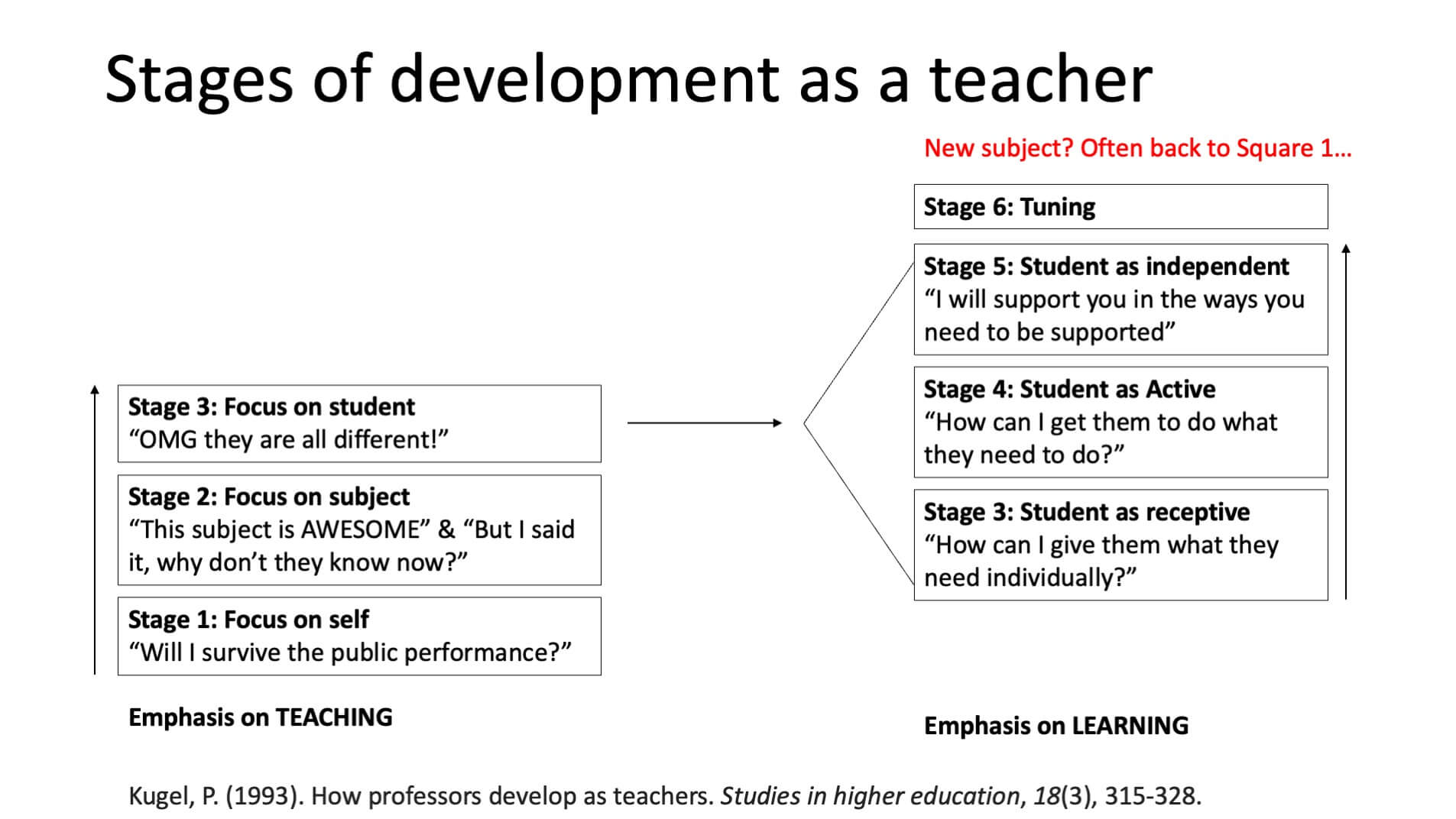
Teaching Kugel (1993)’s “how professors develop as teachers”.
Another article that I just re-read for my teaching next week is Kugel (1993)’s “how professors develop as teachers”. Kugel describes the development of teachers in 6 stages that are very relatable and thus great to discuss, both to identify a current stage for yourself (and possibly teachers you encounter?), to reflect on that, and to get ideas for future developments:
Stage 1: Focus on Self
This is where most of us started when we teach: Being very focussed on surviving and about not being found out as someone who has no clue of what they are doing (and being surprised how much more difficult it is to explain things than “just to understand” and afraid of running out of things to say), feeling vulnerable, and being full of adrenaline. Validation as a teacher comes mainly through students expressing that they appreciate (aspects of) our teaching, even though there is a lot to learn for example through reflection and conversations with colleagues.
When we’ve survived this stage for a while, the focus changes:
Stage 2: Focus on Subject
Now it’s about knowing the answer to every possible question students might have, and to bring in as much of the super interesting content as possible; passing on our knowledge and skills and excitement by packaging content as inspiringly and completely as possible (but thereby depriving students of the chance to think by themselves or see us think ourselves). So now we might worry about running out of time rather than running out of things to say. The danger is, of course, that we say way too much and that students have no chance of processing it, and at this stage that might lead to the temptation of complaining about our students laziness, stupidity or lack of preparation. Since we taught the content, what other explanation might there be for why they aren’t picking it up?
Stage 3: Focus on Student
At some point, the focus shifts on to the students as people with different motivations, prior knowledge, skills, abilities. Often teachers react to this with a “buckshot approach”, trying to provide so many different options of everything that everybody should find something that fits them. Now the question is whether the students are actually taking up any of what is said, and that typically means a shift to methods that require more activity of the students, so the teacher gets a better idea of what they understand, for example using quizzes or minute papers. It also means becoming aware that there is no one perfect way to teach specific content and that courses need to be tailored for who is actually taking them.
Stage 4: Student as Active
At this stage, the teacher has transitioned from expert-who-tells to coach-who-lets-others-do. They use active methods to engage students in their learning (rather than using the same methods mostly for assessing their learning, as in the stage before). They find ways to teach that suit themselves, their students, and their content.
Stage 5: Student as Independent
Now, the teacher sees students as independent learners and gives them choice, for example in where they put their focus, and how exactly they engage with content. It is important to the teacher that students learn HOW to learn, as much as, or even more so, as WHAT.
Stage 6: Tuning
This last stage in a way is a combination of all the best aspects of all positive stages, except the teacher is now able to change their focus purposefully on whatever aspect of development they think is most needed in any given situation.
So far, so good!
My plan with this article is that I will be handing out the 5 stages on individual sheets to the 5 participants at each table. I have modified the text of the original article somewhat (for example I have exchanged “professor” to “teacher” to make it more relatable, and I have taken out references to earlier stages; and I have shortened them to all more or less the same length). Participants will then be asked to each read their sheet, summarize the teacher described in it in 5 or fewer words on a card, present it to the rest of their group, and then discuss as a group which of the stages they can relate to, and how they would describe a progression through all those 5 stages. And then, of course, we’ll discuss Kugel’s model.
Curious how that will go! :-)
Kugel, P. (1993). How professors develop as teachers. Studies in higher education, 18(3), 315-328.